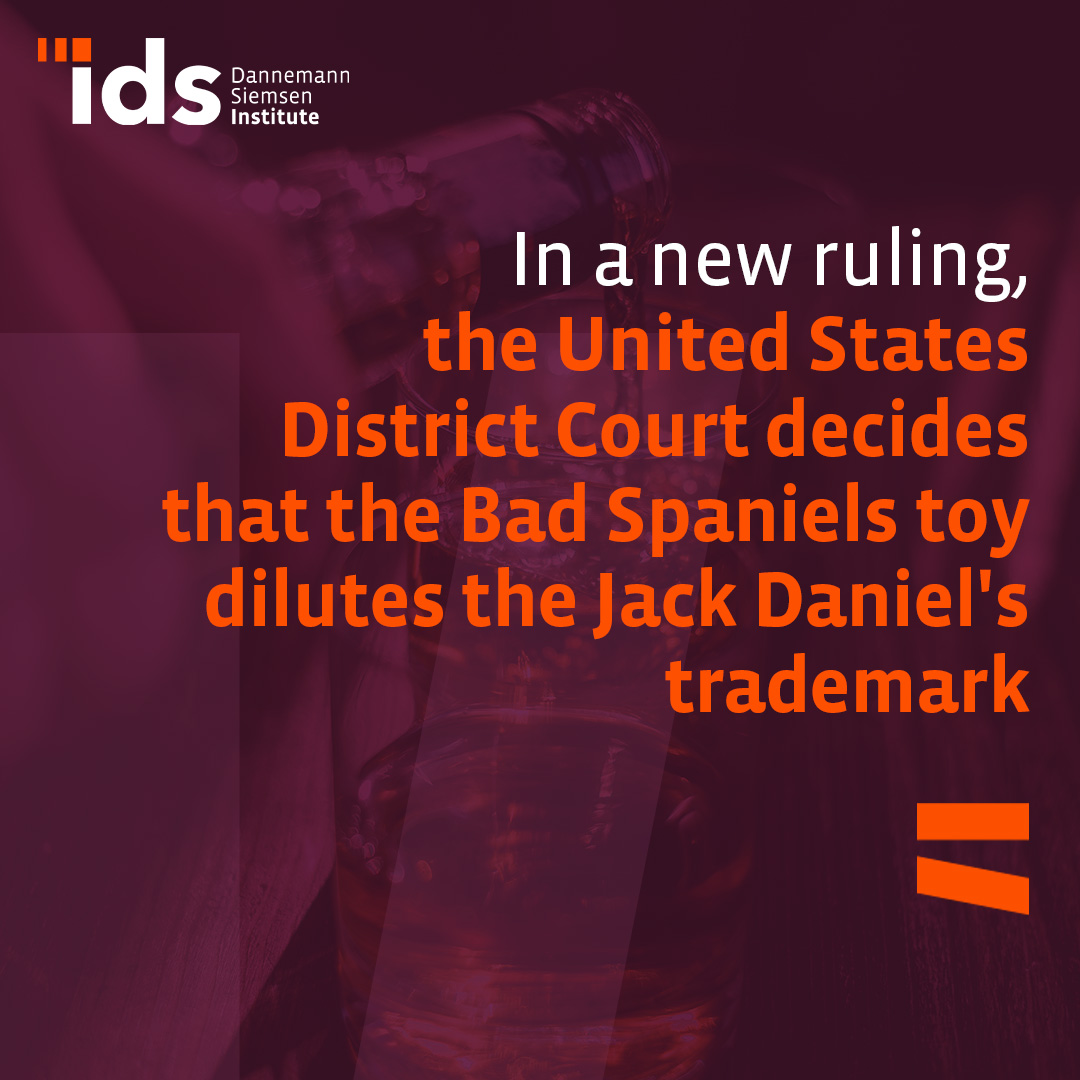11 de março de 2025
Share
In a new ruling, the United States District Court decides that the Bad Spaniels toy dilutes the Jack Daniel’s trademark
In a new ruling, the US District Court for the District of Arizona found that the Bad Spaniels dog toy, a parody of the Jack Daniel’s Black Label whiskey bottle, causes dilution by tarnishment to the Jack Daniel’s brand. This type of dilution occurs when a renowned brand loses its strength by being associated with something negative. In 2014, VIP Products LLC (VIP Products), the manufacturer of the toy, filed a declaratory action to have it recognized that its product did not infringe or dilute Jack Daniel’s trademark rights. Jack Daniel’s filed a lawsuit against VIP Products based on the Lanham Act and Arizona law. The dispute, which has been going on for more than ten years, returned to court following a decision by the US Supreme Court.
On appeal, the Ninth Circuit reversed the first decision of the U.S. District Court for the District of Arizona, holding that the parody fell under the “noncommercial use” exclusion of the Lanham Act. However, the Supreme Court reversed that decision, holding that a parody cannot be considered a “noncommercial use” when used as a source identifier. For the Supreme Court, the Bad Spaniels dog toy was not an “expressive work”, since its use was aimed at identifying origin and therefore does not enjoy the exception granted by the right to freedom of expression, such as parodies which are expressive works. The case was returned to the Ninth Circuit, which in turn remanded the case to the District Court for a new trial.
On this occasion, VIP Products raised a new question about the constitutionality of the ban on trademark dilution for defamation, arguing, based on the First Amendment to the US Constitution, freedom of expression and Supreme Court precedents, that this ban would be a form of discrimination and would be unconstitutional. The U.S. Supreme Court, however, refused to discuss the merits of VIP’s First Amendment argument, as it was not properly presented on the record.
Thus, the district court proceeded to re-examine the case as to the infringement argument for trademark confusion and as to the dilution of the Jack Daniel’s trademark based on the factors of fame and reputational harm.
Regarding similarity, the court recognized that the toy was designed to imitate whisky. As for reputational harm, Judge McNamee, based on an expert in consumer psychology, concluded that there was a high likelihood of harm to Jack Daniel’s reputation, characterizing dilution by tarnishment. Jack Daniel’s argued that the toy’s label associated its brand with canine feces, which would harm consumer perception. VIP contested the lack of evidence of concrete harm, but the court pointed out that the law only requires a likelihood of dilution, not proof of actual harm.
After concluding on the possibility of dilution by disparagement, the court analyzed whether the toy infringed Jack Daniel’s rights, considering its parody nature. Although the toy evoked the brand, the main issue was whether the parody created confusion. Jack Daniel ‘s argued that the similarities were excessive and that the parody mocked the brand, while VIP argued that the parody was effective in using irreverent humor by replacing elements of the label with humorous references, such as “The Old No. 2 on your Tennessee Carpet” and ’43% POO BY VOL.”. The court concluded that the strength of the mark helped to dispel confusion, ruling that although it evoked Jack Daniel’s, Bad Spaniels created sufficient humorous contrasts, and the parody was legally valid with minimal likelihood of confusion.
The judge went on to examine eight factors, known as the Sleekcraft factors, inspired by a previous decision by the Ninth Circuit Court of Appeals. The first factor considered was brand strength, where the court recognized that Jack Daniel’s has a widely recognized and powerful brand. However, when applying the factor of similarity of the marks, the court concluded that although the similarities between Bad Spaniels and Jack Daniel’s marks exist, they are necessary for the success of the parody. VIP’s intention to parody was considered, and the court agreed that this favored the conclusion that there was no confusion or trademark infringement.
Finally, the court concluded that although “Bad Spaniels” was a non-confusing parody, the irreverent nature of the product, by creating contrasts with the Jack Daniel’s brand, could cause damage to the brand’s reputation, resulting in a dilution of its distinctiveness.
The document can be accessed via the link: VIP Products v. Jack Daniel’s Properties
Note: For quick release, this English version is provided by automated translation without human review.
